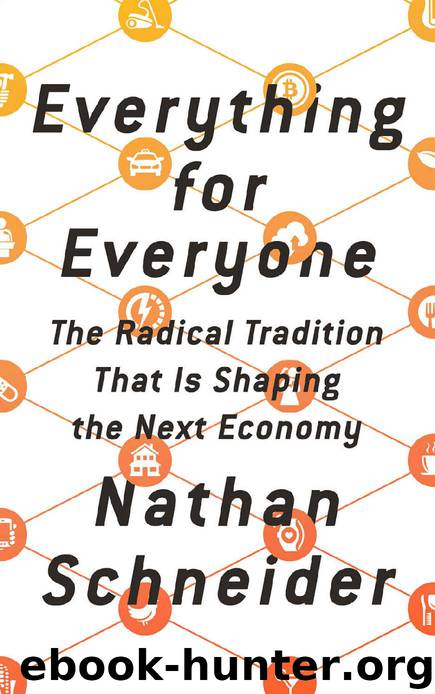Everything for Everyone: The Radical Tradition That Is Shaping the Next Economy by Nathan Schneider

Author:Nathan Schneider [Schneider, Nathan]
Language: eng
Format: epub
Publisher: PublicAffairs
Published: 2018-09-10T23:00:00+00:00
The availability and lack of venture capital in the United States.
When a startup is still just an idea or a minimal prototype, venture capitalists can inject large sums of money for a chunk of ownership. The VCs do that for a lot of startups, most of which don’t pan out. But for those that do, the VCs expect profits to make up for not only that investment but also the ones that fail. Such payouts don’t come from sustainable, linear growth. They come from the “unicorns”—companies that can swallow entire industries. As markets, not just products, platforms are well suited to this. Their game is often winner-takes-all. And as they win, VCs steer their platforms toward a hallowed “exit” event—either an acquisition by a bigger company or an initial public offering on public markets. In the exit, we the users are part of what is being sold.
I’ve started to hear a story on repeat from apparently successful founders of tech companies: Their startup had a great idea, and users thought it was great, too, so it became worth something. Investors offered fast money in exchange for stock. The founders liked a lot of the investors as people and valued their advice. Some became real-life friends. But before long, the founders discovered that their companies were no longer built around that original idea, or even around the users it could serve. The whole point had become to extract gigantic returns for shareholders—and to disguise that fact from users. The great idea, together with the users it attracted, became a commodity.
Young people with clever ideas, but not a lot of business experience, get drawn in. Their mentors and accelerators groom them to be what investors want to see. For some, it works. But most good ideas are not that rare, monopoly-scale unicorn that disrupts the world and delivers the huge returns investors need to keep lavishing the next new startups with easy money. It’s not enough for a platform to be merely useful or profitable; investment funds need commodities, not communities.
Consider Paul Allen—not the billionaire who co-founded Microsoft, but the one who brought the world Ancestry.com, the genealogy platform. Allen and his co-founder started with CD-ROMs in 1990 and then started making websites later that decade. They owned nearly the whole company and were soon turning a profit. They raised millions of dollars from investors, moved the headquarters from Utah to San Francisco, and by Y2K, they were edging toward being one of the top ten web properties in the world.
Then there was an aborted public offering and a sequence of deals—deals that Allen now admits he didn’t fully understand. The slice of shares he owned grew smaller, and he finally left the company and its board in 2002, watching as Ancestry endured the vicissitudes of various private-equity buyers and sellers. He’s still proud of what the platform he helped build offers its users, but he has grown philosophical as he watches the current investor-owners squeeze the company for whatever they can get—even eliminating troves of users’ family memories in the process.
Download
This site does not store any files on its server. We only index and link to content provided by other sites. Please contact the content providers to delete copyright contents if any and email us, we'll remove relevant links or contents immediately.
| Anthropology | Archaeology |
| Philosophy | Politics & Government |
| Social Sciences | Sociology |
| Women's Studies |
Nudge - Improving Decisions about Health, Wealth, and Happiness by Thaler Sunstein(7689)
The Fire Next Time by James Baldwin(5421)
iGen by Jean M. Twenge(5403)
Adulting by Kelly Williams Brown(4561)
The Sports Rules Book by Human Kinetics(4377)
The Hacking of the American Mind by Robert H. Lustig(4368)
The Ethical Slut by Janet W. Hardy(4236)
Captivate by Vanessa Van Edwards(3835)
Mummy Knew by Lisa James(3680)
In a Sunburned Country by Bill Bryson(3528)
The Worm at the Core by Sheldon Solomon(3483)
Ants Among Elephants by Sujatha Gidla(3458)
The 48 laws of power by Robert Greene & Joost Elffers(3219)
Suicide: A Study in Sociology by Emile Durkheim(3011)
The Slow Fix: Solve Problems, Work Smarter, and Live Better In a World Addicted to Speed by Carl Honore(3001)
The Tipping Point by Malcolm Gladwell(2908)
Humans of New York by Brandon Stanton(2864)
Handbook of Forensic Sociology and Psychology by Stephen J. Morewitz & Mark L. Goldstein(2691)
The Happy Hooker by Xaviera Hollander(2683)
